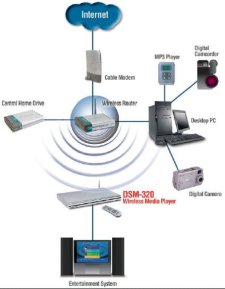Linux-powered wireless media player uses dual-licensable SSL security suite
Mar 23, 2005 — by Henry Kingman — from the LinuxDevices Archive — views PeerSec Networks says D-Link used its suite of SSL security products in a line of Linux-based media players. The D-Link DSM series players use PeerSec's MatrixSSL embedded security suite, a modular, small-footprint, high-performance security suite available for Linux under free or commercial licenses.
PeerSec Networks says D-Link used its suite of SSL security products in a line of Linux-based media players. The D-Link DSM series players use PeerSec's MatrixSSL embedded security suite, a modular, small-footprint, high-performance security suite available for Linux under free or commercial licenses.
(Click for larger view of D-Link DSM-320)
The D-Link DSM series
D-Link's DSM media players include the DSM-320 and DSM-320RD, which adds a DVD player and card reader. The players have inspired a Wiki-based community of embedded hackers interested in creating open source Linux firmware for them. According to one forum post, a D-Link Technical Support person confirmed that the devices are based on MontaVista Linux.
The DSM-320 is a wireless device designed to attach to a television or home theater. It connects with home networks wirelessly, enabling the TV to ouput media files residing on computers attached to the home LAN.

D-Link's DSM-320 attaches to TVs or home theaters
(Click to enlarge)
The DSM-320 is based on a Micrel KS8695p, a single-chip, integrated ARM9 gateway platform SoC (system-on-chip) that also powers a media player reference design developed by Micrel and RedSonic.
The device includes a 10/100 Ethernet port, and also supports 802.11b/g wireless networking. It includes a swivel-type monopole 2.4GHz antenna with an impedance of 50 ohms and a claimed gain of 2dBi. The device supports UPnP AV 1.0 and INMPR standards for configuration.
Output ports include RCA audio, RCA video, S-video, component video, optical digital audio, and coaxial digital audio.
The media player uses HTTP to stream files, and supports playback/display of formats that include MP3, WAV, WMA, JPEG, JPEG2000, GIF, PNG, TIF, MPEG1-4, AVI, Xvid. It also supports playlist formats, including M3U and PLS.
PeerSec's MatrixSSL
MatrixSSL achieved its first stable release in April, 2004. The GPL version can be used to add SSLv3 based security to open source software applications such as Web browsers, chat clients, XML translators, and machine-to-machine (M2M) communications. The commercial version can be used with proprietary applications, and adds support for Transport Layer Security (TLS) and Advanced Encryption Standard (AES).
According to PeerSec, MatrixSSL offers a standards-based implementation of SSL and TLS, the two algorithms most commonly used to secure protocols such as HTTP, SIP, H.323 and EAP-TLS. MatrixSSL also provides client and server authentication, using industry standard ciphers. It's low footprint security implementation gives D-Link the ability to reduce the overall firmware size in their current products, PeerSec says, freeing up hardware resources for next-generation media formats as they enter the market.
Maggie Chen, director of product management for D-Link, said, “PeerSec's embedded security solution allowed us to significantly reduce the footprint of our security implementation. MatrixSSL was easy to integrate into the MediaLounge Wireless Media Player, saving us development time through use of the existing hardware.”
J Harper, CEO of PeerSec Networks, said, “Our agreement with D-Link furthers our strategic goal of working closely with leading manufacturers to provide enterprise level security for devices. The media player market is growing rapidly, and networked devices without security will soon be obsolete. By embedding MatrixSSL into their media player devices, D-Link is now able to provide the strongest security possible to their customers, while keeping their devices compelling and feature rich.”
Availability
The D-Link DSM-320 and DSM-320RD are available now, at street prices of $190 and $275, respectively.
MatrixSSL is available now, and has been ported to 20 platforms, PeerSec says, including Linux and uClinux, eCos, Mac OS X, Windows CE, pSOS, BREW, and VxWorks. A free evaluation download is available online.
This article was originally published on LinuxDevices.com and has been donated to the open source community by QuinStreet Inc. Please visit LinuxToday.com for up-to-date news and articles about Linux and open source.